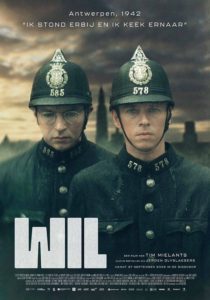Wil (2023) – Morality or Survival
Genre – WW2 resistance film
Time: 1 hour 50 minutes
Platform: Netflix
Language: Dutch. German.
All clickable links are in red

Every country occupied by the Nazis (and Japanese) between 1940-45 had indigenous Resistance movements of various shapes and sizes. Some, like the Norwegians, had some stunning successes (refer to the post on The Norsk Hydro operations). The French Resistance was the most famous but suffered due to factional fighting. The Germans had thoroughly penetrated the Dutch Resistance (refer to Operation Nord Pol). The Czechs carried out the most spectacular act – assassinating the Nazi head of Czechoslovakia, Reinhard Heydrich, but the repercussions totally decimated the Czech Resistance (refer to the post on Operation Anthropoid). The Belgians, sandwiched between France, Holland, and Germany, had Resistance acts of varying degrees of success. In almost all the occupied countries, the “ordinary’ policeman was supposed to help the Germans “maintain law and order” – in short, be an auxiliary for the German Occupiers. Which also included rounding up anyone who stood up to the Germans.
So, as a policeman, what would you do? Obey your superiors and round up innocents? Or quietly refuse to do so? Or run with the hares and hunt with the hounds? Each option has consequences, as the ordinary policeman Wilfried Wils (Stef Aerts) discovers immediately after being commissioned as an ordinary policeman.
A German Field Policeman commands him and his colleague Lode (Matteo Simoni) to locate a Jewish family and “relocate them”. They watch as mute spectators when the mother tries to send her daughter to their neighbours – only to see the child being refused entry and walking back to the apartment where the policeman is refusing requests from the Head of the family and is bent upon shooting him. Commanded to herd the family of father, daughter and granddaughter, the duo moodily do it. The daughter and granddaughter try to escape. The enraged policeman is then killed accidentally by Wils. (This entire section is absolutely harrowing though no actual violence is shown – we become mute spectators and cant help but be overwhelmed by the emotions on display)
Then follows the duo’s odyssey. The Germans turn Brussels upside down, shooting suspects left, right, and centre. Wils confesses the episode to his father, who works in City Hall, who then brings in the City Counselor. Lode’s entire family, including his sister Yvette (Annelore Crollet), are Resisters. Yvette pressures Wils to join the Resistance, but he prefers to take the middle path.
To say anything more would be a crime.
This is one of the finest films on life in the Resistance movements without any heroics. The atmosphere is dark—in every sense of the word. Since most of the scenes happen at night, there is a grim sense of foreboding that something bad will happen.
The continuous propaganda of the Germans reduced the Jews, Communists and anyone who disagreed with their thoughts to non-human status. This dehumanization – prevalent worldwide even today – is an excuse for the “humans” to carry out atrocities on the less fortunate. Lode takes a side. So, too, Yvette.
Wils trying to do the right thing is balanced by “external factors” – namely, the Councilor and the Nazi Officer pressurizing him to join their side. The former shows the benefits of that life, while the latter shows what happens to resisters and anyone who doesn’t toe the line. Wils’ Chief Jean is tortured gruesomely, but he continues to inspire Wils to sing about the two bears and how they watched all events – the same ditty with which Wils and Lode had been introduced to police work on the first day.
History records that Belgium raised an SS Division, the Walloon Division, to fight on the Eastern Front. Their leader, Leon Degrelle, escaped to Spain at the war’s end. He wrote an autobiography, Burning Souls, and various books explaining his unrepentant role in the war.
In such an atmosphere, Belgian Resistance successes were mild at best. They increased in intensity once the tide of the war turned (like many other occupied European and Japanese countries).
Moral ambiguity. Courage. Fear. Terror. Unchained raw emotions. Losing one’s moral compass. All these and more are covered in this brilliant low-key film that punches far above its weight, leaving one gasping in shock and awe.
All the performances are outstanding, and this is one of the truly great films about the fine line between moral ambiguity, convenience and courage.
Real History/ Historical Background – 4 out of 5
Script – 5 out of 5
Story – 4 out of 5
Direction – 4 out of 5
Photography – 5 out of 5
Total – 4.4 out of 5
Rammesh,
Thanks for the eloquent, concise review. Above all, its brings into focus man’s brutality and the desperate struggle to survive. Loved your links to other related material.
“This dehumanization – prevalent worldwide even today”… well-said.
“I don’t know if you call them people, in some cases, they’re not people in my opinion,”
… “animals” ……” they’re “poisoning the blood of our country,” – a politician, as recently as yesterday, on the campaign trail.
I have added this film to my Netflix watchlist, after reading your review.
Warm regards
Robin
Thanks. Its not an easy watch but once you get started there is no stopping as you watch with fascination Wil’s gradual descent and change .
Btw, really loved your first line of this. It was a like a proper hook for me. And also one of the last ones:
Moral ambiguity. Courage. Fear. Terror. Unchained raw emotions. Losing one’s moral compass. All these and more are covered in this brilliant low-key film that punches far above its weight, leaving one gasping in shock and awe. Adding to my watch list. Thanks for sharing KV!